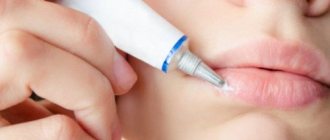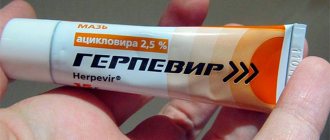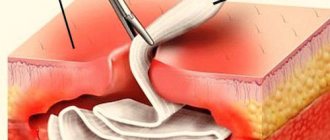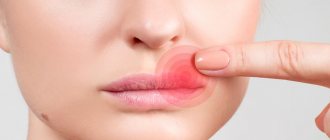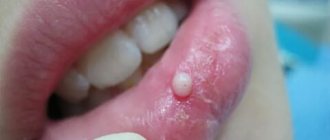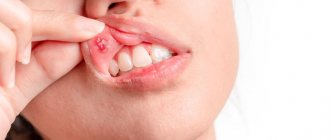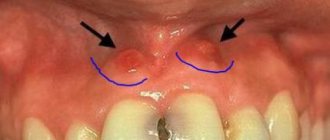The question of whether it is possible to go to the dentist with herpes worries those who suddenly have a toothache, but there are rashes on the lips. Herpes is a well-known viral disease that has a long history and is characterized by many forms.
The herpes virus is present in the body of 90% of the entire population of the planet. In some people it is dormant, while in others it constantly manifests itself, especially after provoking factors such as colds and decreased immunity. As a rule, people are especially worried about herpes on the lips, since it is impossible to hide it, and the white blisters attract a lot of attention, and the person feels awkward.
There are a number of cases when herpes on the lips can bring not only emotional discomfort, but also serious troubles. One such case is toothache due to herpes on the lips. Few people know what to do in such cases, because you want to stop the pain in your tooth, but you don’t want to go to the doctor with affected lips. Today we will talk about whether it is possible to go to the dentist with herpes if the toothache is very severe and you do not have the strength to endure it.
Why did herpes appear on the gums?
For the virus to make itself felt, two things are enough: its presence in the blood and a weakened immune system.
Infection occurs by airborne droplets and can be transmitted from mother to child. Unfortunately, once you become infected with herpes, you can no longer get rid of it. But you can prevent its activation.
So, after infection, virus particles settle in the body forever. Most of the time the virus does not manifest itself in any way. What factors provoke the manifestation of the virus on the gums? Stress, including sudden nervous shock, chronic depression and fatigue, colds, bacterial and viral diseases, hypothermia, autumn or spring hypovitaminosis. A common cause of the appearance of “bubbles” characteristic of this disease is acclimatization. Are you familiar with the situation when the disease manifests itself on vacation, when changing time zones? Therefore, when planning trips, it is better to immediately stock up on antiviral drugs and ointments.
How to recognize herpes
The difficulty is that the symptoms of herpes in the mouth are easily confused with the manifestation of stomatitis and other diseases of the oral mucosa.
Differences:
- as a rule, stomatitis affects a larger area of the oral mucosa compared to herpes;
- swelling with herpes is less: with stomatitis, there may even be traces of teeth on the mucous membrane of the cheeks;
- ulcers that form during stomatitis have more defined boundaries;
- stomatitis often contributes to the appearance of a very dense coating on the tongue; with herpes, such a symptom does not appear;
- very often with stomatitis (especially purulent, with ulcers), the pain is more intense, it intensifies when the disease spreads over a large area of the mucous membrane. The pain is aching, especially in ulcers, and it becomes difficult to eat food, especially hard and hot food.
Photo of herpes on the gum:
If measures are not taken in time, a viral infection can become complicated and take the form of herpetic stomatitis:
How to understand that the virus has been activated? The first symptoms are tingling on the gums, itching and burning sensation. Then the color of the oral mucosa may change, unpleasant swelling appears locally, then a bright red rash appears, and the last stage is the formation of characteristic “bubbles” with liquid. As the disease progresses, the pain intensifies. When bubbles appear (they are called vesicles), the pain becomes cutting, its intensity increases when eating food or hot drinks.
Vesicles are dropsy filled with fluid with a high concentration of virus. Their sizes increase over time and can reach from 1 mm to 1 cm in diameter. At some point they burst, leaving a painful wound. If an infectious infection occurs, the wound becomes covered with a yellow crust, the mucous membrane of the oral cavity is increasingly affected, flowing into diffuse stomatitis.
External symptoms may include:
- increase in body temperature up to 38 degrees;
- chills;
- increase in size of lymph nodes;
- weakness, loss of strength;
- headache.
Such symptoms more often appear in children, with severe disease and the presence of an inflammatory process. In this case, you cannot do without consulting a doctor.
As a rule, the clinical picture of the disease is obvious. If a relapse does not occur for the first time, often the blisters are localized in the same areas: on the inner surface of the cheeks, tongue, gums. Your doctor may prescribe an oral swab to rule out a fungal or bacterial infection.
There are several types of herpes. As a rule, virus strains 1 and 2 appear on the gums. The consequences can be serious, especially if action is not taken promptly. If it was possible to extinguish the external manifestations of the infection, this is not a reason to refuse further treatment. First of all, you need to determine what type of herpes the patient is dealing with: PCR diagnostics will help with this. If you have a herpes infection, you can contact specialists such as an ENT specialist, an infectious disease specialist, or an immunologist. They will help you choose a treatment regimen that will minimize relapses of the disease in the future.
When you need to treat your teeth even if you have a “cold” on your lip
Let's now look at situations where treating teeth in the presence of herpes on the lips is not only possible, but also necessary:
- urgent tooth extraction for herpes on the lip: that is, it is an urgent treatment (and not a planned one) - because the removal in this case alleviates the patient’s condition. And if the tooth is not removed, complications may begin, including hospitalization in the department of maxillofacial surgery and surgery,
- severe toothache that does not go away after taking painkillers,
- gumboil (periostitis) and gum decay,
- severe tooth decay, which is accompanied by various symptoms - pain, bleeding, headache, gum inflammation: this situation is possible when a natural crown is chipped or a prosthesis is displaced,
- high fever due to toothache or jaw pain.
Here, urgent removal is most often carried out, less often - installation of a temporary filling, opening of the periosteum to drain out purulent masses, removal of the damaged prosthesis (and its disinfection). Additionally, the dentist uses increased measures to maintain the sterility of the work area, and then sanitary cleaning and air quartzing are carried out in the room. The patient is prescribed medications to speed up rehabilitation - antibiotics, oral baths with a decoction of chamomile or oak bark.
“The child had a severe toothache at night; he couldn’t sleep at all. But analgin did not help. In the morning I called the dentist to figure out what to do. After all, the little one has a cold, and it’s contagious. But the hospital told me to bring him in and they’ll take a look. As a result, they pulled this tooth and there was pulpitis. And they prescribed a bunch more pills.”
Anna L., Ekaterinburg, review from otzonik.com
Antiviral drugs
Their goal is to suppress the pathogen, shorten the duration of the exacerbation, and reduce the intensity of symptoms. The most popular products are Acyclovir and Zovirax in the form of tablets and creams. Using cream in the mouth is difficult, so tablets are optimal. They drink them in a course.
It is better to start treatment at the first signs of the disease. In some cases it can be stopped. Interferon nasal drops have also shown their effectiveness in the initial stages of herpes. At the very least, they prevent the spread of infection into the respiratory tract.
We have already found out that the main reason for the manifestation of herpes is weakened immunity. Conclusion: to avoid relapses, it is necessary to increase the body's defenses. To do this, you should contact an immunologist, who will refer you for diagnostics and prescribe individual treatment. Sometimes it includes immunomodulators - drugs that can increase immunity (Immunal, Imudon and others), folk remedies (for example, echinacea tincture), vitamin and mineral complexes. You can also take specialized complexes of vitamins and minerals, for example, ASEPTA® Parodontal to strengthen teeth and gums: its active components help not only reduce bleeding and inflammation in the oral cavity, but also maintain general immunity.
General recommendations on how to strengthen the body and increase its protection:
- avoid stress, improve sleep;
- include as many fresh vegetables, fruits, and herbs in your diet as possible;
- to drink a lot of water;
- exercise or swimming.
In case of exacerbation of herpes on the gums, it is recommended to adhere to a diet: remove spicy, fatty, too hot foods from the diet, exclude hot and alcoholic drinks. To avoid irritating the mucous membranes, avoid smoking.
The difficulty of using creams and ointments is not a reason to refuse local treatment for herpes. Rinsing and irrigating the oral mucosa will help relieve symptoms and prevent the spread of infection. Good products: Hexoral, chlorhexidine, hydrogen peroxide solution, furatsilin, as well as anesthetic sprays, rinsing solutions, gels with anesthetics (for example, Lidoxor gel, which relieves burning and irritation). Adhesive gum balm ASEPTA® is an effective combined antimicrobial agent that has a wide spectrum of action against gum disease pathogens, thanks to the combination of metronidazole + chlorhexidine, and guarantees long-term fixation on the gums.
How is herpetic infection treated?
To quickly cope with a herpetic infection, the patient is prescribed special medications that specifically target the causative agent of the pathology. Most often these are the drugs Acyclovir or Zovirax. They are used in the form of ointments, which are applied to the affected areas of the lips until the blisters burst. Doctors also recommend using Acyclovir orally, but in tablet form. If the herpetic infection is very strong (localized over large areas of the face and body) or appears many times a year (more than 6-8), then droppers with Acyclovir may be prescribed.
Experts' opinion
Research conducted at the Kazan State Academy has determined that the use of preparations from the Asepta line (gels, balms, toothpastes, rinses) increases the effectiveness of treatment of chronic catarrhal gingivitis and other inflammations, mild and moderate chronic periodontitis, hyperesthesia of hard dental tissues, which together significantly reduces the duration of treatment and increases the duration of remission in this category of patients.
Sources:
- The use of drugs from the Asepta line in the complex treatment of inflammatory periodontal diseases (N.V. Berezina E.N. Silantyeva S.M. Krivonos, Kazan State Medical Academy. Kazan.) N.V. BEREZINA, E.N. SILANTIEVA, S.M. KRIVONOS Kazan State Medical Academy
- https://cyberleninka.ru/article/n/sovremennye-lechebno-profilakticheskie-sredstva-dlya-individualnoy-gigieny-polosti-rta Silantieva E.N., Berezina N.V., Krivonos S.M. Complex treatment of chronic recurrent aphthous stomatitis using drugs from the Asept line, Practical Medicine journal
- Clinical and laboratory assessment of the influence of domestic therapeutic and prophylactic toothpaste based on plant extracts on the condition of the oral cavity in patients with simple marginal gingivitis. Doctor of Medical Sciences, Professor Elovikova T.M.1, Candidate of Chemical Sciences, Associate Professor Ermishina E.Yu. 2, Doctor of Technical Sciences Associate Professor Belokonova N.A. 2 Department of Therapeutic Dentistry USMU1, Department of General Chemistry USMU2
- Clinical studies of antisensitive toothpaste “Asepta Sensitive” (A.A. Leontyev, O.V. Kalinina, S.B. Ulitovsky) A.A. LEONTIEV, dentist O.V. KALININA, dentist S.B. ULITOVSKY, Doctor of Medical Sciences, Prof. Department of Therapeutic Dentistry, St. Petersburg State Medical University named after. acad. I.P. Pavlova
- The role of anti-inflammatory rinse in the treatment of periodontal diseases (L.Yu. Orekhova, A.A. Leontyev, S.B. Ulitovsky) L.Yu. OREKHOVA, Doctor of Medical Sciences, Prof., Head of Department; A.A. LEONTIEV, dentist; S.B. ULITOVSKY, Doctor of Medical Sciences, Prof. Department of Therapeutic Dentistry of St. Petersburg State Medical University named after. acad. I. P. Pavlova
- Report on clinical trials of anti-inflammatory balm for gums "Asepta" adhesive, St. Petersburg State Medical University, 2007
